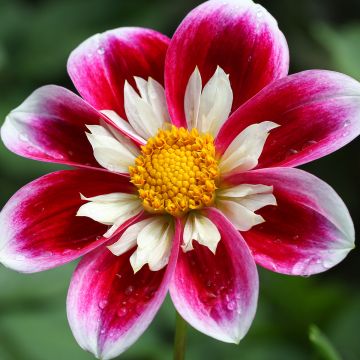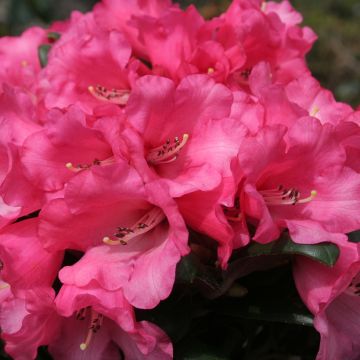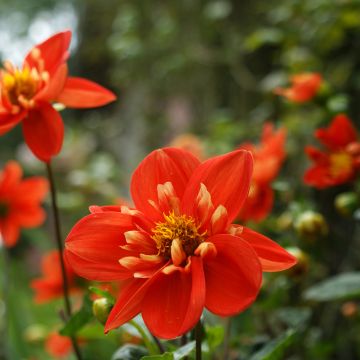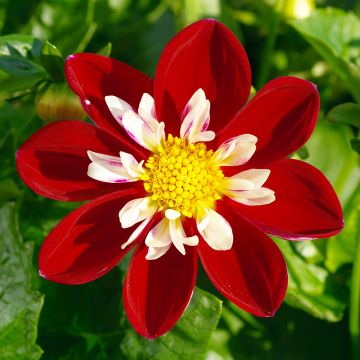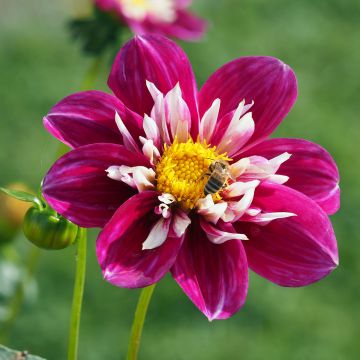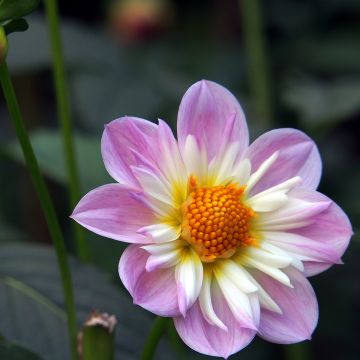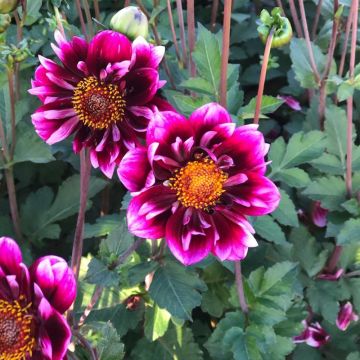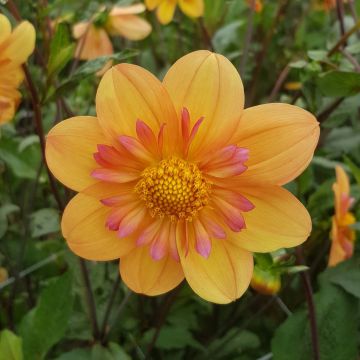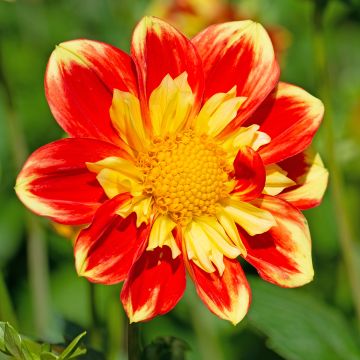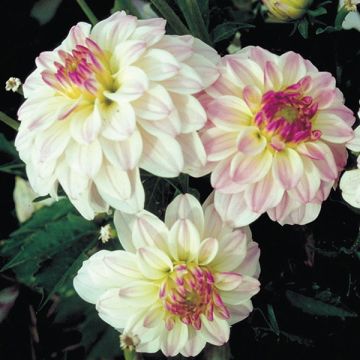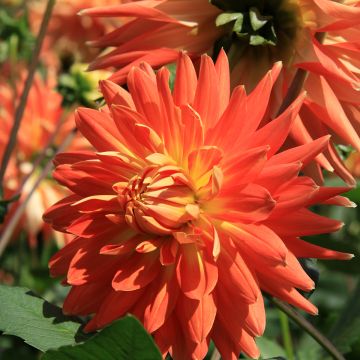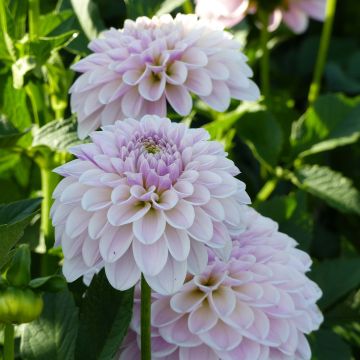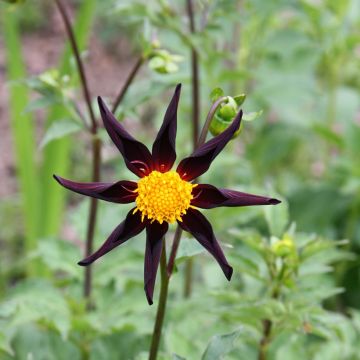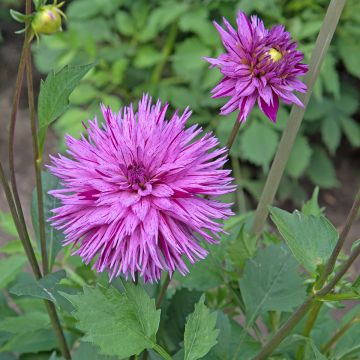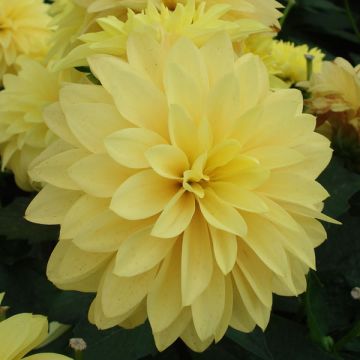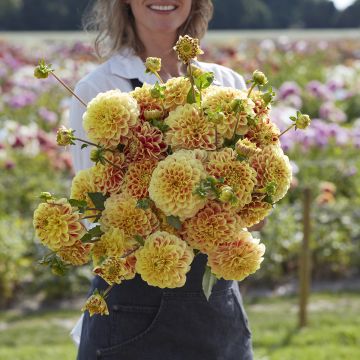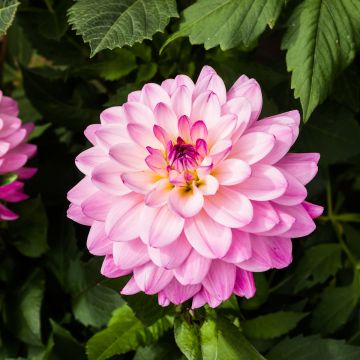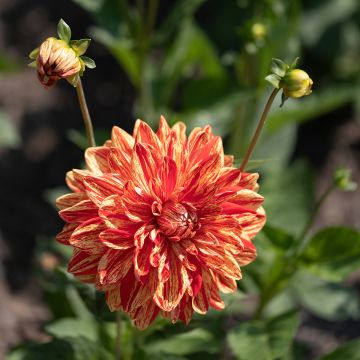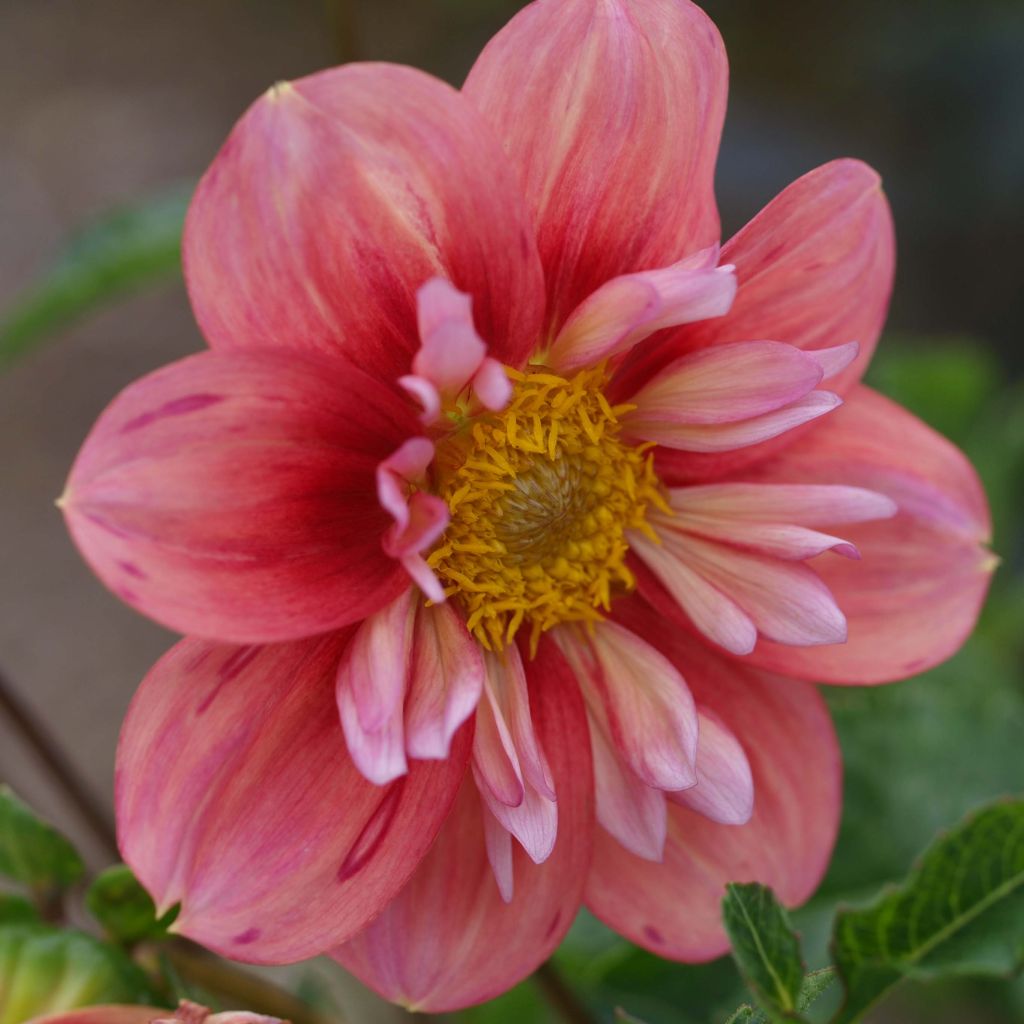

Dahlia Collerette Giggles
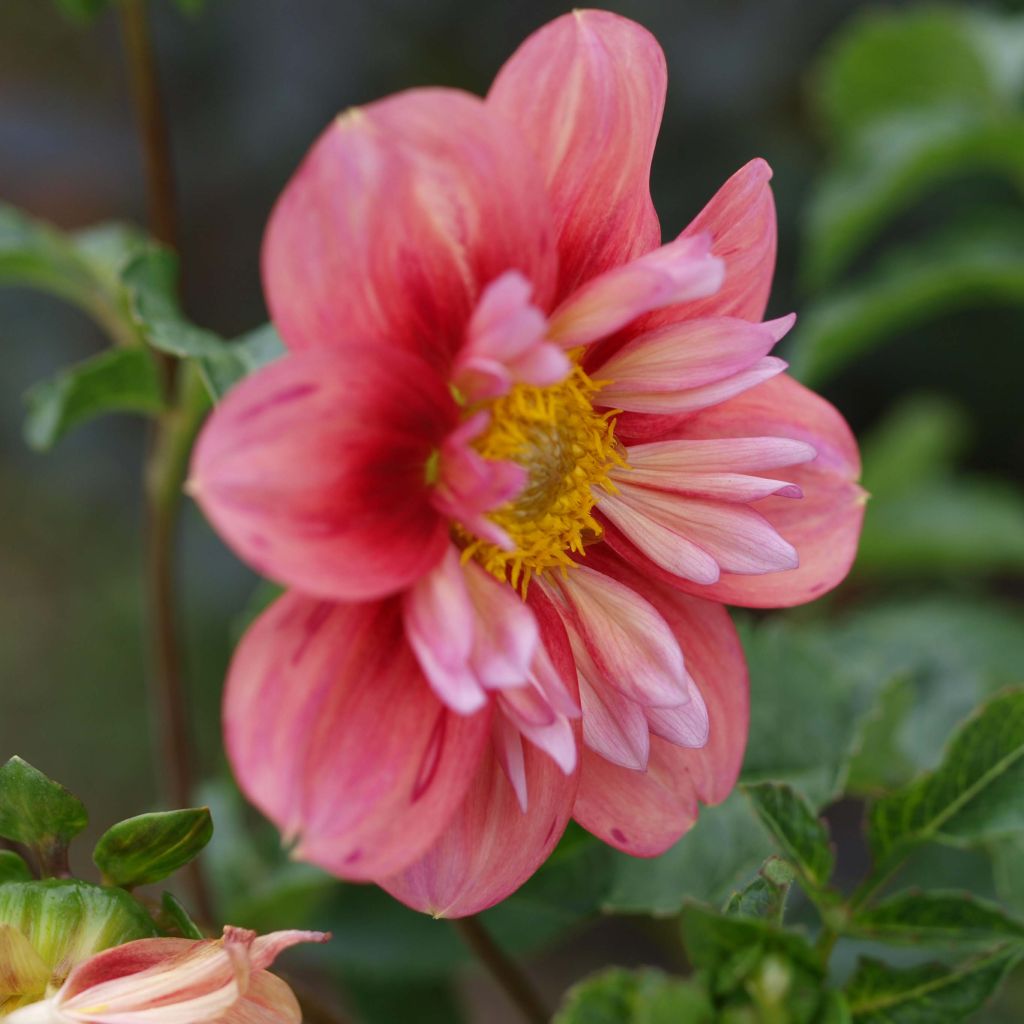

Dahlia Collerette Giggles
Dahlia Giggles
Dahlia Giggles
Dahlia
This plant carries a 6 months recovery warranty
More information
We guarantee the quality of our plants for a full growing cycle, and will replace at our expense any plant that fails to recover under normal climatic and planting conditions.
From €5.90 for pickup delivery and €6.90 for home delivery
Express home delivery from €8.90.
Does this plant fit my garden?
Set up your Plantfit profile →
Description
The Dahlia 'Giggles[' is a tall variety, particularly floriferous, offering a unique combination of colours that stands out in flower beds. It produces numerous small flowers that catch the eye, with sunset-coloured petals surrounding a central collar of small petals in a nuanced lavender-tinged orange, arranged around a large yellow heart. 'Giggles' forms a large flowering bush that is ideal for the background of flower beds. Its stunning flowers last a long time in bouquets.
Dahlias belong to the aster family and are originally from the high plateaus of Mexico. Currently, the approximately 25,000 horticultural varieties created by humans have invaded gardens worldwide, much to our delight.
The 'Giggles' variety, introduced in 1998, is classified as a collarette dahlia due to the architecture of its inflorescences. This is a horticultural category defined by the shape of the flower. In this group, the colourful ligules of the head are arranged regularly in a crown, around a collar of tiny petals surrounding the central disk. The flowers of 'Giggles', which are 8 to 10cm (3 to 4in) wide, have outer ligules in a fairly soft salmon orange, while those in the centre are a lavender-tinged pink-orange. The flower's golden heart makes it even more radiant. The remarkably abundant flowering occurs from July to October. It has a bushy and upright habit. The highly branched stems are hollow, and the leaves are opposite and pinnately divided into 3 or 5 highly toothed lobes. The leaves and stems are dark green.
To encourage repeat flowering, make sure to remove faded flowers, or even better, regularly create large colourful bouquets by combining it with other varieties.
The 'Giggles' variety, with its sunset-toned flowers, pairs particularly well with blue or mauve flowers and silver or purple foliage. In the back of flower beds, this dahlia will create colourful spots alongside echinaceas, foxtail amaranths, or pink cannas, for example, which bloom at the same time, as well as daylilies and asters. Tall grasses with autumn colours like Phormium tenax 'Purpureum' and Imperata 'Red Baron' will provide support for its opulent growth while enhancing its flowering.
A star plant in borders and herb gardens, dahlias confidently accompany the most beautiful flowers but are also appreciated alongside vegetable plants. In Mexico, this tuber was initially cultivated as a root vegetable for consumption. However, its poor taste relegated it to the status of an ornamental plant. Since then, the interest in their beautiful exuberance has never waned.
Report an error about the product description
Dahlia Giggles in pictures
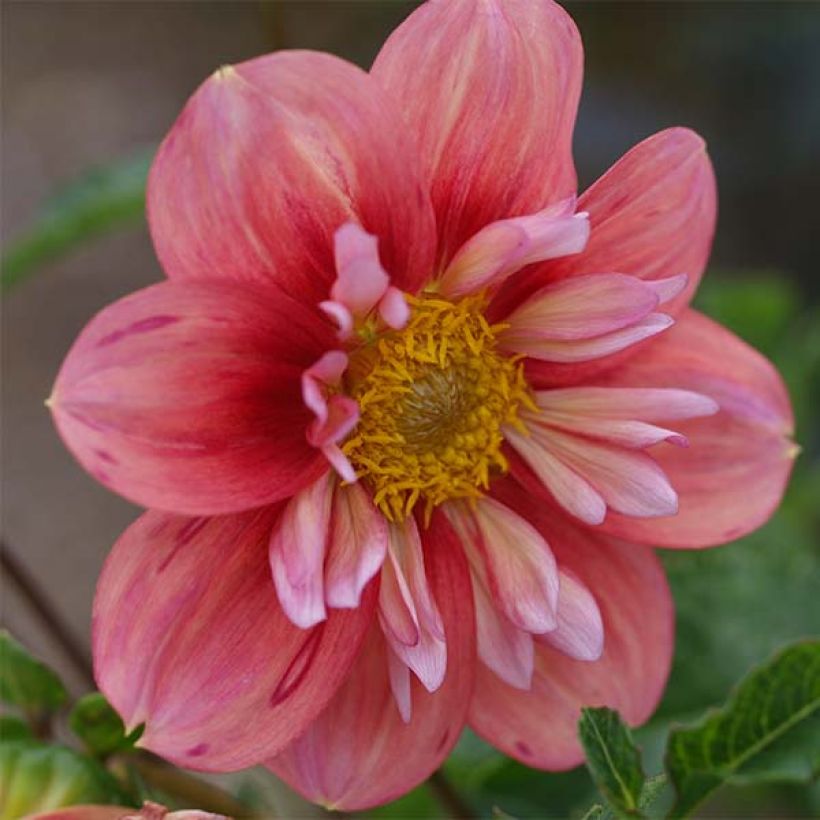

Plant habit
Flowering
Foliage
Botanical data
Dahlia
Giggles
Asteraceae
Dahlia
Cultivar or hybrid
Other Collarette Dahlia
Planting and care
The Collerette Dahlia 'Giggles' is easy to grow in all regions. For abundant flowering, it is good to follow a few simple rules, plant the tubers in a sunny location as soon as the last frost has passed, rich, fresh, and well-drained soils are perfect. However, stagnant moisture would promote tuber rot. Feel free to amend the soil with compost and sand if necessary. Work the soil deeply and enrich it, for example, with crushed horn or dehydrated blood. Place your tuber and crumble the soil well to fill the hole without air pockets. Your dahlia should be covered with about 6 cm (2in) of soil. At the end of planting, water abundantly once and then regularly for the first 6 weeks to help with rooting.
Dahlias are sensitive to cold, they need to be overwintered under shelter. In November, the first frosts blacken the foliage, so it is time to dig them up. Carefully unearth the tubers. Remove as much soil as possible. Let the foliage dry so that the tubers can replenish their reserves. Then cut the stems down to 10 cm (4in). Spread your bulbs in a crate on newspaper. Store them protected from frost in a dry, cool, and dark place, such as a frost-free garage or an attic. In the southern regions, close to the coast, where there are few frosty days per year, it is possible to leave them in place. In this case, simply cover the ground with a layer of leaves or straw for protection.
This tall dahlia, with its hollow stems, is not resistant to wind or heavy rain. To overcome this drawback, you can stake it but it's not very attractive. On the other hand, by pinching the stems early you can spread out the habit of the plant, which will offer more resistance to bad weather. Alternatively, you can remove the axillary flower buds to channel the flow of sap to a single flower, which will become larger and sturdier, though taller.
Planting period
Intended location
Care
This item has not been reviewed yet - be the first to leave a review about it.
Dahlias
Haven't found what you were looking for?
Hardiness is the lowest winter temperature a plant can endure without suffering serious damage or even dying. However, hardiness is affected by location (a sheltered area, such as a patio), protection (winter cover) and soil type (hardiness is improved by well-drained soil).

Photo Sharing Terms & Conditions
In order to encourage gardeners to interact and share their experiences, Promesse de fleurs offers various media enabling content to be uploaded onto its Site - in particular via the ‘Photo sharing’ module.
The User agrees to refrain from:
- Posting any content that is illegal, prejudicial, insulting, racist, inciteful to hatred, revisionist, contrary to public decency, that infringes on privacy or on the privacy rights of third parties, in particular the publicity rights of persons and goods, intellectual property rights, or the right to privacy.
- Submitting content on behalf of a third party;
- Impersonate the identity of a third party and/or publish any personal information about a third party;
In general, the User undertakes to refrain from any unethical behaviour.
All Content (in particular text, comments, files, images, photos, videos, creative works, etc.), which may be subject to property or intellectual property rights, image or other private rights, shall remain the property of the User, subject to the limited rights granted by the terms of the licence granted by Promesse de fleurs as stated below. Users are at liberty to publish or not to publish such Content on the Site, notably via the ‘Photo Sharing’ facility, and accept that this Content shall be made public and freely accessible, notably on the Internet.
Users further acknowledge, undertake to have ,and guarantee that they hold all necessary rights and permissions to publish such material on the Site, in particular with regard to the legislation in force pertaining to any privacy, property, intellectual property, image, or contractual rights, or rights of any other nature. By publishing such Content on the Site, Users acknowledge accepting full liability as publishers of the Content within the meaning of the law, and grant Promesse de fleurs, free of charge, an inclusive, worldwide licence for the said Content for the entire duration of its publication, including all reproduction, representation, up/downloading, displaying, performing, transmission, and storage rights.
Users also grant permission for their name to be linked to the Content and accept that this link may not always be made available.
By engaging in posting material, Users consent to their Content becoming automatically accessible on the Internet, in particular on other sites and/or blogs and/or web pages of the Promesse de fleurs site, including in particular social pages and the Promesse de fleurs catalogue.
Users may secure the removal of entrusted content free of charge by issuing a simple request via our contact form.
The flowering period indicated on our website applies to countries and regions located in USDA zone 8 (France, the United Kingdom, Ireland, the Netherlands, etc.)
It will vary according to where you live:
- In zones 9 to 10 (Italy, Spain, Greece, etc.), flowering will occur about 2 to 4 weeks earlier.
- In zones 6 to 7 (Germany, Poland, Slovenia, and lower mountainous regions), flowering will be delayed by 2 to 3 weeks.
- In zone 5 (Central Europe, Scandinavia), blooming will be delayed by 3 to 5 weeks.
In temperate climates, pruning of spring-flowering shrubs (forsythia, spireas, etc.) should be done just after flowering.
Pruning of summer-flowering shrubs (Indian Lilac, Perovskia, etc.) can be done in winter or spring.
In cold regions as well as with frost-sensitive plants, avoid pruning too early when severe frosts may still occur.
The planting period indicated on our website applies to countries and regions located in USDA zone 8 (France, United Kingdom, Ireland, Netherlands).
It will vary according to where you live:
- In Mediterranean zones (Marseille, Madrid, Milan, etc.), autumn and winter are the best planting periods.
- In continental zones (Strasbourg, Munich, Vienna, etc.), delay planting by 2 to 3 weeks in spring and bring it forward by 2 to 4 weeks in autumn.
- In mountainous regions (the Alps, Pyrenees, Carpathians, etc.), it is best to plant in late spring (May-June) or late summer (August-September).
The harvesting period indicated on our website applies to countries and regions in USDA zone 8 (France, England, Ireland, the Netherlands).
In colder areas (Scandinavia, Poland, Austria...) fruit and vegetable harvests are likely to be delayed by 3-4 weeks.
In warmer areas (Italy, Spain, Greece, etc.), harvesting will probably take place earlier, depending on weather conditions.
The sowing periods indicated on our website apply to countries and regions within USDA Zone 8 (France, UK, Ireland, Netherlands).
In colder areas (Scandinavia, Poland, Austria...), delay any outdoor sowing by 3-4 weeks, or sow under glass.
In warmer climes (Italy, Spain, Greece, etc.), bring outdoor sowing forward by a few weeks.

































